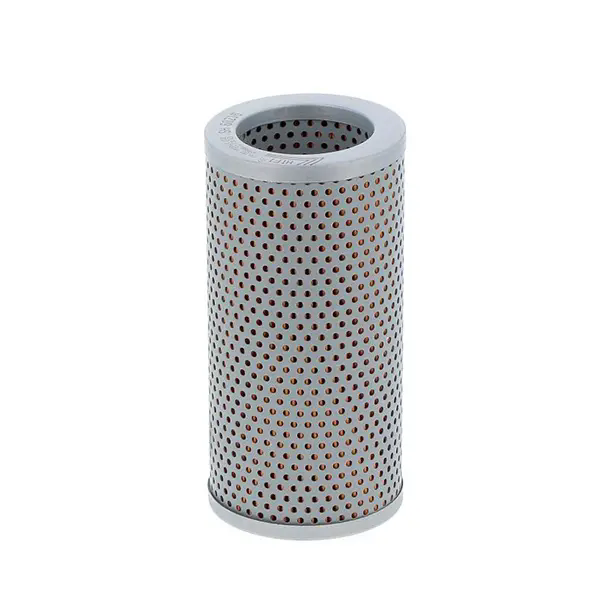Hydraulic Filter: Essential for System Efficiency and Longevity
2025-05-07
A hydraulic filter is a critical component in hydraulic systems, ensuring that the fluid circulating within the system remains clean and free from contaminants. These filters are designed to trap dirt, particles, and other foreign materials, preventing them from causing wear or damage to pumps, valves, and other key components. The importance of hydraulic filters cannot be overstated, as they directly contribute to the efficiency, longevity, and performance of hydraulic machinery. This article will explore the function, types, and benefits of hydraulic filters in various industrial applications.

What is a Hydraulic Filter?
A hydraulic filter is a device used to remove impurities, such as dust, dirt, metal particles, and other debris, from hydraulic fluid. Hydraulic systems use fluid to transmit power, and maintaining the fluid’s cleanliness is essential to ensure smooth operation. The filter helps keep the fluid free from contaminants that could cause clogging, increase wear on components, or lead to system failure. By trapping these particles, hydraulic filters protect the integrity of the system and help extend its operational lifespan.
How Do Hydraulic Filters Work?
Hydraulic filters work by forcing hydraulic fluid through a filtering medium that captures particles and contaminants. These filters are typically made of materials like metal mesh, pleated paper, or synthetic fibers. As the fluid passes through the filter, impurities are trapped in the filter media, while the clean fluid continues to flow through the system. Filters come in different designs, including inline filters, return filters, and pressure filters, each serving a unique function within the system.
Hydraulic filters are generally installed at various points in a hydraulic system, such as the suction line, return line, or in the pressure circuit, depending on the filtration requirements of the system. Their efficiency is determined by the size of the particles they can capture and the flow rate at which they operate.
Types of Hydraulic Filters
1. Suction Filters: These filters are placed in the suction line of the hydraulic system, ensuring that no debris enters the pump. Suction filters are usually coarse filters, designed to catch larger particles that could damage the pump or other components. They help protect the system's most sensitive parts from contamination at the very start of the fluid circulation process.
2. Return Line Filters: Return line filters are typically located in the return line of the hydraulic system, where fluid returns after passing through the system. These filters are designed to remove smaller particles that may have accumulated during the operation of the hydraulic system. Return line filters help ensure that the fluid re-entering the reservoir is clean, preventing the contaminants from circulating again.
3. Pressure Filters: Pressure filters are used to protect the high-pressure components of a hydraulic system, such as pumps and valves. These filters are designed to operate under high-pressure conditions and are typically finer than suction or return filters. By filtering the fluid at high pressure, they help maintain the system’s efficiency and prevent clogging or damage to sensitive components.
4. Inline Filters: Inline filters are installed directly in the hydraulic fluid lines and are used to provide continuous filtration throughout the system. These filters can be either coarse or fine, depending on the specific needs of the application. They are often used in conjunction with other filters to provide multiple stages of filtration.
5. Magnetic Filters: Magnetic filters use magnetic fields to attract and capture metallic particles in hydraulic fluid. These filters are especially effective in systems where the presence of metal debris, such as shavings from pumps or valves, is a concern. Magnetic filters help extend the life of other filters by capturing ferrous particles before they reach finer filtration stages.
Benefits of Hydraulic Filters
1. Improved System Efficiency: By removing contaminants from the hydraulic fluid, filters ensure that the fluid can flow smoothly through the system. This reduces friction and the potential for clogging, leading to more efficient operation. Clean hydraulic fluid ensures that pumps, valves, and other components function optimally, improving the overall performance of the hydraulic system.
2. Extended Equipment Life: Contaminants in hydraulic fluid can cause excessive wear on system components, leading to premature failure and costly repairs. Hydraulic filters play a crucial role in protecting the integrity of the system, extending the lifespan of expensive machinery and reducing the need for frequent maintenance.
3. Reduced Downtime: Contamination in hydraulic systems is one of the primary causes of system failures and unplanned downtime. By ensuring that the fluid remains clean and free from impurities, hydraulic filters help minimize the risk of failures, leading to fewer breakdowns and more reliable operations.
4. Enhanced Safety: A well-maintained hydraulic system reduces the risk of leaks, pressure buildup, and system malfunctions. Hydraulic filters help keep the system functioning properly, reducing the risk of accidents or safety hazards caused by malfunctioning components.
5. Cost Savings: While the initial cost of installing hydraulic filters may seem like an added expense, the long-term benefits of preventing costly repairs, extending the life of equipment, and reducing downtime make them a wise investment. The cost of replacing a filter is significantly less than the cost of repairing or replacing a damaged pump or valve.
Applications of Hydraulic Filters
1. Manufacturing and Industrial Equipment: Hydraulic filters are widely used in manufacturing machines, such as presses, molding machines, and CNC machines. These systems rely on hydraulic fluid to operate, and clean fluid is essential for maintaining the precision and performance of the equipment.
2. Construction and Excavation Machinery: Heavy-duty construction machinery, such as excavators, bulldozers, and cranes, often use hydraulic systems to operate large components like booms and arms. Hydraulic filters are essential for keeping these systems clean and operational in demanding conditions.
3. Agricultural Equipment: Tractors, combine harvesters, and other agricultural machinery use hydraulic systems to power attachments and implement mechanisms. By incorporating hydraulic filters, these machines can function efficiently, even in harsh farming environments.
4. Automotive Industry: Many vehicles, including trucks, buses, and forklifts, rely on hydraulic systems for steering, lifting, and braking functions. Hydraulic filters are essential to maintaining the smooth operation of these vehicles and ensuring their safety and reliability.
5. Marine Applications: Hydraulic filters are also used in marine equipment, such as ships, submarines, and offshore drilling rigs. Marine environments are particularly harsh, and hydraulic filters help maintain the cleanliness of hydraulic fluid to prevent damage from contaminants.
Conclusion
Hydraulic filters are an essential component of any hydraulic system, ensuring the smooth operation, efficiency, and longevity of the system. They provide numerous benefits, including improved system performance, extended equipment life, and cost savings. Whether in industrial manufacturing, construction, agriculture, automotive, or marine applications, hydraulic filters play a crucial role in maintaining the integrity and functionality of hydraulic systems. By investing in high-quality filters and ensuring regular maintenance, businesses can safeguard their equipment and maximize the operational efficiency of their hydraulic systems.


